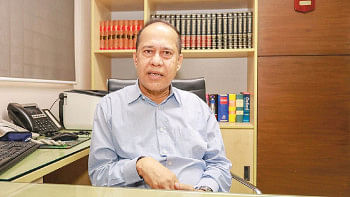Why not remove the cap on lending interest rate?

The proverbial expression "A stitch in time saves nine" came to my mind when I saw the news in The Daily Star on August 5, 2022 that the Bangladesh Bank (BB) had decided not to use the "textbook solution" to curb inflation – i.e. increasing the lending interest rate. "Textbook solution" are the words that the new governor, Abdur Rouf Talukder, used to express his disinterest in employing the long-proven method, both theoretically and empirically, to tame inflation by raising the lending interest rate. His main argument was that increasing the interest rate at this time would take Bangladesh's "economy backward," and therefore the central bank had taken an alternative, "out-of-box" approach. During the economic slowdown, the channel through which the increased lending rate tames inflation is something that may not please the government in the short run, but this is the unfortunate trade-off that every country has to face when seriously considering policies to reduce high inflation. In other words, you must induce some "cooling down" in the economy for the inflation to decline before it is too late.
Although too early to predict the future trajectory, the US has seen zero inflation in July, partly owing to the Fed rate hikes. Nevertheless, the BB governor claimed that there was "no need to follow the US on a mandatory basis" by raising the lending rate, since Bangladesh handled the pandemic-induced crisis by following its own methods. With regard to this statement from the BB governor, I would like to point out two facts. First, the US is not the only country that has raised the Fed rate to counter inflation in recent times. The UK as well as our neighbour, India, have also raised their policy rates in a bid to tame inflation.
While it is true that what might work for other countries may not work for Bangladesh, any economic policy that is to be implemented must have theoretical or empirical underpinnings. A case in point is Turkey. Economists agree that the unsustainably low interest regime achieved through Turkey cutting the policy rate several times in the recent past has significantly contributed to the soaring of its inflation rate to 70 percent in April 2022. That is a situation that both the central bank and the government in Bangladesh would want to steer clear of.
Second, Bangladesh did follow suit when the US as well as other developed countries adopted various stimulus packages to tackle the economic crisis during the early stage of the Covid-19 pandemic. This expansionary fiscal policy was a "textbook solution," too, which Bangladesh did not hesitate to implement. Then why not adopt the long-proven "textbook solution" and raise the interest rate by contracting the money supply in Bangladesh?

One possible concern may be that many projects undertaken by the government are fuelled by bank loans. Therefore, increasing the interest rate may result in increased public expenditure. There are multiple ways to alleviate this concern. First, an increase in the interest rate will prompt the government to carefully reconsider its projects and continue with only those that are viable and offer a positive rate of return. Second, the government may overhaul its tax collection strategies and clamp down on tax evaders. That also means redirecting resources to the National Board of Revenue (NBR) to equip them with adequate workforce, tools and, most importantly, independence from undue political pressures, such that they can collect taxes from where its due. As a by-product, increased tax revenue can have an anti-inflationary impact on the economy. That is a win-win situation for the government and the Bangladesh Bank!
Two things need to be clarified here. First, this so-called contractionary monetary policy does not need to be permanent as it can be eased once inflation drops down to a rate that does not significantly disrupt the people's purchasing power. Second, the "out-of-box" approach espoused and the "textbook solution" shunned by the BB need not be mutually exclusive. They can go hand in hand. In fact, at this juncture, where the actual inflation rate may be much higher than what is being currently reported by the BB based on the 2005-06 CPI basket (7.56 percent in June 2022), a synergy between the "textbook solution" and an appropriate "out-of-box" approach may be more effective in bringing inflation under control even sooner.
Raising the interest rate can also help with Bangladesh's concern about the quickly depleting foreign currency reserves, partly due to the declining foreign remittance. For example, the government may consider revising the US Dollar Investment Bond Rules, 2002 to reflect the higher interest rates to be paid to non-resident Bangladeshi (NRB) investors. Currently, the government offers two types of dollar-denominated bonds to NRB investors: Premium Bond with 7.5 percent annual interest rate, and Investment Bond with 6.5 percent annual interest rate. If these interest rates are allowed to increase, it can attract the much-needed foreign currencies, including the US dollars. However, the inflow of US dollars, in particular, will be contingent on the competitiveness of the interest rates offered by Bangladeshi bonds.
Currently, the US government-backed and inflation-protected Series I bonds are paying a 9.62 percent annual rate through October 22, the highest yield since they were introduced in 1998. In contrast, the Bangladesh Bank has capped the interest rate on loans at nine percent. Unless this cap is removed to allow the bond rate to increase sufficiently, NRB investors will be unlikely to invest in comparatively risky bonds issued by the Bangladesh government and might just prefer to remain invested in the US. Furthermore, a complementary financial instrument that the government may consider at this point is sukuk or the sharia-compliant bonds. Currently, there appears to be an unmet demand for these types of products among the NRBs, most of whom adhere to the Islamic faith.
Last but not the least, economic growth in terms of nominal GDP per capita is important, but this should not be the only goal in the grand scheme of things. People's purchasing power is also a key indicator of a country's economic well-being, which gets eroded by high inflation. Therefore, policymakers should take that into account while implementing any economic policies. Recently published news reports indicate the government's interest in seeking a loan from the International Monetary Fund (IMF). However, it should also keep in mind that the IMF's anti-inflation prescription that may be packaged with a potential loan aligns with the so-called "textbook solution." In one of the recent IMF blog posts, titled "Emerging Economies Must Prepare for Fed Policy Tightening," three IMF economists advised the emerging economies grappling with inflation to adjust their monetary policies by raising benchmark interest rates. The Bangladesh Bank should not lose this early opportunity to showcase to international lenders its strong commitment to curbing inflation by removing the cap on the lending rate. This will also send a strong, credible message to the market about the central bank's sincere intention to fight inflation. Empirical evidence suggests that often a mere announcement by the central bank of such a move can initiate the inflation reduction process by influencing public perception, even before the policy becomes effective.
Dr Tasneem Raihan is a Bangladeshi-American financial economist. The views expressed in this article are the author's own and do not necessarily reflect the views of his employer or any other entities with which he may be associated.

 For all latest news, follow The Daily Star's Google News channel.
For all latest news, follow The Daily Star's Google News channel. 









Comments